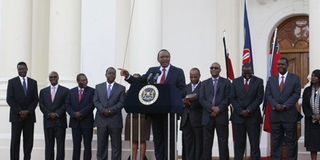Breaking News: Old Kijabe dam tragedy: Death toll rises to 45
Five things Uhuru can do to help calm a nation rattled by Shabaab

PHOTO | FILE President Uhuru Kenyatta and his cabinet address journalists at State House in Nairobi on January 28, 2014.
What you need to know:
- The circumstances under which he was appointed are instructive. As politically minded observers will recall, the initial UhuRuto Cabinet sparked a minor storm because it did not include either a Maasai or a member of the Mijikenda communities.
- Now that the president can’t fire the police chief, one way around it is to form new agencies to coordinate the fight against a type of enemy Kenya has not known before.
Call in Nkaissery: I’m not one of those that rails at Interior minister Joseph ole Lenku every time something goes wrong. He is a victim of circumstances and was given a job beyond his pay grade.
The circumstances under which he was appointed are instructive. As politically minded observers will recall, the initial UhuRuto Cabinet sparked a minor storm because it did not include either a Maasai or a member of the Mijikenda communities.
A few days later, Mr Lenku and Mr Kazungu Kambi took up their Cabinet posts. Those smacked of panic nominations.
Since the country’s politics remains deeply ethnicised, why not conduct a minor reshuffle and bring in the eminently qualified Joseph ole Nkaissery?
Ole Lenku can be given a soft landing at, say, the Ewaso Nyiro Development Authority and then you would have, as head of the security function, a man who knows his job and can raise the flagging morale of a rattled population.
Summon Maj-Gen Hussein Ali: A mistake in the drafting of the Constitution – understandable because the whole reform movement was, let’s face it, a crusade against Mzee Moi’s overzealous use of the State House rungu – was the extent to which the drafters went in neutering the presidency.
Now that the president can’t fire the police chief, one way around it is to form new agencies to coordinate the fight against a type of enemy Kenya has not known before.
How better than to constitute a joint anti-terrorism command and to hand the reins to Maj-Gen Ali who, for all his failings, at least inspired the police force, saw the virtual eradication of crime in urban centres (under his watch people could finally pick calls on the streets) and spoke with an authority that meant wananchi could sleep comfortably at night.
Invest in technology: Apart from railways and roads, could the Chinese chip in with rolling out blanket CCTV coverage in crime and terror hotspots?
There will be an outcry by liberals on Twitter but they should be ignored. When cities such as London first engaged in a major CCTV installation programme, there were huge protests by those who claimed it was a breach on their privacy.
In fact, this camera surveillance has had a phenomenal impact in reducing crime rates and in catching suspects. Today, crime in London is at a low not seen in decades.
KDF'S ROLE IN SOMALIA
Think seriously about KDF’s role in Somalia: There is a mistaken notion that getting out of Somalia will somehow be an admission of defeat by the KDF.
What defeat? KDF has been the most successful foreign force that has ventured into that perennial battleground in modern history.
They have inflicted major economic, strategic and territorial pain on the Shabaab, pushing them out of key urban centres and into forested areas. They have taken the lowest casualties of all the other players there, thanks to their strategy of forging local alliances and wooing local communities and will depart with their heads held high.
Let’s not forget that before Operation Linda Nchi, Al-Shabaab crossed the border and abducted two soldiers, Corporal Evans Mutoro and Sergeant Jonathan Kangogo, in an extremely brazen attack.
Maybe due to pride Kenya chose to focus on the abduction of foreigners to justify military operations but, whatever happens, Al-Shabaab and the region at least now know there are costs to attacking Kenya willy-nilly.
However, there is a reason why regional authorities have always advised that borderline states should keep out of Somalia.
Hurling grenades around is the easiest thing to do. The Shabaab will enjoy doing that for a long time. And to what end? The UN missions in DRC and Sudan are perpetual deployments because there is no exit strategy. Kenya can’t afford that. A phased exit, leaving the territory in southern Somalia to other forces, would be a better option.
Maintain friendly ties with everyone: Kenya’s relations with much of Africa are at an all-time high now but there is no need for the continued difficult ties with other players in the West, who have a big stake in security and can be vital allies.
When it comes to terrorism, it does no harm to have as many friends in your camp as you can.
[email protected] Twitter: @mutigam





